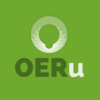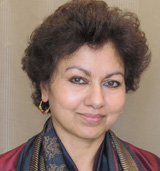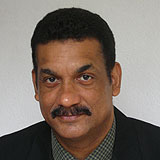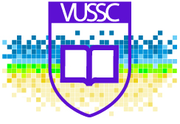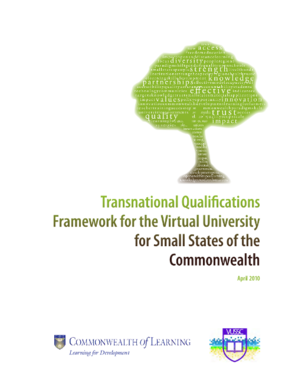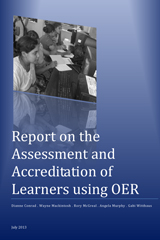OERu TQF and articulation meeting report
| OERu 2013 Events | |
|---|---|
| OERu 13.11 OERu TQF and Course Articulation Meeting | Homepage and agenda | Participants | Report |
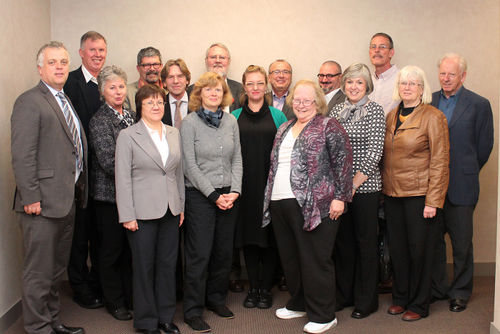
The UNESCO-COL Chairs in OER at Athabasca University and Otago Polytechnic facilitated the OERu Transnational Qualifications Framework and Course Articulation meeting at the headquarters of the Commonwealth of Learning in Vancouver on 4 November 2013. The implementation of the OERu is a designated project of the UNESCO-COL OER Chair Network.
Participants included senior leaders from the OERu network and experts in open distance learning, online learning and recognition of prior learning (RPL).Building on the outputs of the OERu 13.10 2nd Meeting of Anchor Partners, participants commenced discussions to progress credit transfer, course articulation and related quality assurance issues within the network.
The group: (1) considered the adoption of the Transnational Qualifications Framework developed by COL; (2) reviewed the pedagogical and assessment approaches used for the OERu prototype courses, and (3) decided on actions to progress the further development of course articulation and accreditation within the OERu network.
Contents
Welcome and aims of the meeting
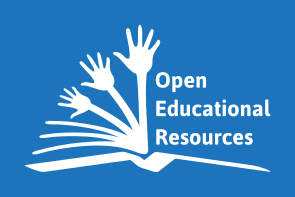
| “ | COL believes that knowledge is the common wealth of humankind and that all education content developed from public funds must be made available under open licenses so that more people are able to benefit from the initial investment. | ” |
| —Professor Asha Kanwar | ||
Professor Asha Kanwar, President and Chief Executive Officer of the Commonwealth of Learning welcomed participants to the COL headquarters in Vancouver.
The COL has a commendable history in sharing learning materials online as open access and promoting OER through the Commonwealth, including for example: the STAMP 2000+ initiative supporting teacher development in Science, Technology and Mathematics; nurturing the foundation years of the WikiEducator community; becoming the first international governmental agency to adopt an open licensing policy; leading the OER for Open Schooling project which developed 17 specially selected secondary school subjects for use in Botswana, India, Lesotho, Namibia, Seychelles and Trinidad & Tobago; collaborating with UNESCO on the international consultation leading to the adoption of the UNESCO Paris 2012 OER Declaration; and supporting advocacy and dissemination of knowledge on OER through an impressive range of publications on open education.
The UNESCO-COL OER Chairs summarised the aims of the meeting as follows:
|
Transnational qualifications framework
The COL commissioned the South African Qualifications Authority to develop the TQF on behalf of VUSSC's TQF management committee. The TQF was developed as a reference system which links national qualification systems of the small states of the Commonwealth and functions as a translation device for making qualifications more readable for cross-border mobility of learners. The TQF was designed to improve credit transfer and to promote common articulation and accreditation mechanisms for VUSSC member countries. John reported that the recent referencing of the TQF with the Malta Qualifications Framework will result in the TQF aligning with the European Qualifications Framework. The TQF has also been referenced in the Caribbean through the CARRICOM Qualifications Framework. Openly licensed, the TQF provides an existing international framework for the OERu to reference its own courses and programme of study. John summarised a robust and elaborate process for registering qualifications on the VUSSC TQF.
Since the OERu network is predicated on the membership of recognised institutions duly accredited through their own regional or national accreditation agencies and that the OERu partners confer credentials in accordance with existing local policy protocols, the additional bureaucracy of a qualifications approval and registration process would not be required by the OERu network. However, the OERu partners recognise the value of a "universal language" for level descriptors and credits within a network working across five continents. The OERu will adapt the TQF for this purpose. Individual OERu partners retain institutional autonomy regarding recognition of the level within their own systems and this will provide a "quality check" for partner institutions when assigning level descriptors. The group recommended that OERu partners consider mapping their respective national or regional qualifications frameworks to the TQF.
Actions to progress OERu credit transfer, course articulation and accreditation
The base model of the OERu is that courses contributed to the network must be accredited towards a credential on the books at the contributing member institution. Many OERu anchor partners have existing procedures and policies in place for recognising transcripted credit for transfer from recognised institutions in accordance with local matriculation requirements taking into account that recognition for unspecified credit (or electives) towards the local credential is more flexible.The meeting focused on course-based assessments recognising that comprehensive recognition of prior learning practices offer policy solutions for integrating transfer credit, course credit and learning "outside the traditional classroom." Examples of the assessment models used by the OERu prototype courses were illustrated confirming sound open distance learning design and exemplars of best practice whereby OERu course assignments were aligned with specified course outcomes and detailed assessment rubrics. Participants reviewed the assessment scenarios published in the Report on the Assessment and Accreditation of Learners using OER which provide a conceptual framework for the OERu to explore different configurations of assessment reuse and credentialing options.
Discussions highlighted the importance that OERu partners must be institutions recognised by their respective regional or national accreditation agencies, but that this requirement would not necessarily be sufficient for the successful implementation of the range of assessment and credentialing scenarios. For example, the OERu will need to consider minimum standards for student identity validation or mechanisms to deal with the unlikely situation where a "quality" institution were to develop a substandard OERu course where assessment practices would not meet the credit recognition requirements of partner institutions. The British Columbia Council on Admissions and Transfer (BCCAT) was cited as an example which the OERu should consider for the network. The concept of an "OERu designated" course was mooted referring to a scalable peer-review system to designate courses and corresponding summative assessment models which meet minimum specified requirements determined by the network. The need for providing a few best practice "templates" for OERu assessment was recommended to help OERu partners with the design of their courses. This highlighted the need for developing an OERu partners manual to support new members joining the network. The group considered processes for establishing and managing working groups. The OERu will adapt and modify the WikiEducator Policy for Workgroups.
Actions
- Adapt and modify the WikiEducator Policy for Workgroups for the OERu network to guide procedures for our working groups.
- Develop examples of best practice for OERu assessment models to support design and development work.
- Develop an OERu partners manual.
- Establish a Credit transfer and course articulation advisory working group to develop guidelines for implementing assessment scenarios.
